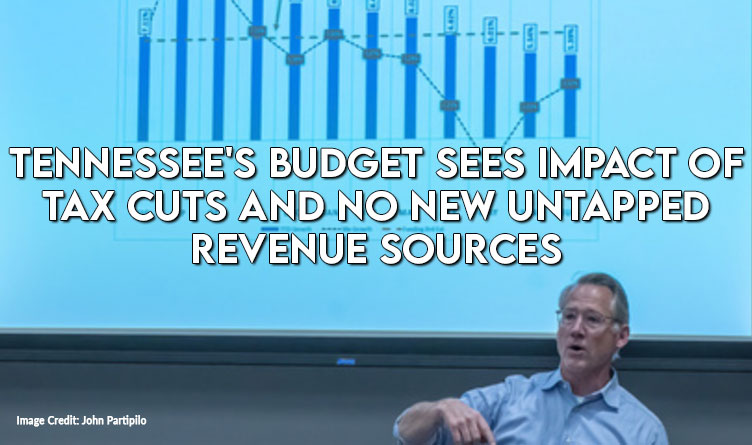The state was able to start collecting internet sales tax right before the coronavirus caused a boom in online sales.
Image: Sen. Bo Watson, R-Hixson, chair of the Senate Finance, Ways and Means Committee, talks to colleagues about a forecasted slowdown in state revenue. Image Credit: John Partipilo
By Adam Friedman [Tennessee Lookout -CC BY-NC-ND 4.0] –
Two things have driven Tennessee’s massive rise in state revenues over the past five years: the ability to collect taxes on internet sales and an enormous growth in franchise and excise tax collections.
But as the online sales tax money becomes a normal part of the state budget and lawmakers’ 2023 franchise and excise tax cuts go into effect, the days of significant revenue growth are likely in the rearview mirror.

Over the past five years, Tennessee has seen its state revenues increase from $17.4 billion to $24.7 billion, or a year-over-year increasing average of 9%, a significant increase that most state officials failed to see coming.
Franchise and excise taxes increased by $2.2 billion between 2019 and 2023. Sales taxes have grown by $4.4 billion, with that increase partially driven by a court decision that allowed the state to start collecting sales taxes on internet sales.

In 2018, the state collected $0 on online sales tax. By 2023, the state collected $911 million.
This money has allowed the state to increase its education funding by a billion dollars, hand out significant incentives to new businesses (like $884 million for Ford) and approve lots of new money to upgrade sports venues (like the NFL stadium in Nashville and NBA arena in Memphis).
It also allowed Tennessee lawmakers to approve various tax cuts like this year when it rewrote deductions and several other parts of the state’s franchise and excise tax law and created a three-month sales tax exemption on groceries.
This business tax cut — which contains a provision allowing businesses to deduct a large portion of new capital investments — has led to a slowdown in franchise and excise that state budgeting officials didn’t predict.

Most of the state’s franchise and excise tax collections occur at the end of the fiscal quarter — Sept. 30, Dec. 31, March 31 and June 30 — meaning the best way to see the pace of collections since the tax cut is to look at the last three months.
From July 1 to Sept. 30, 2023, franchise and excise taxes missed projections by around $61.4 million. By comparison, sales tax exceeded projections by $74 million in the fiscal quarter despite the unpredictability surrounding the holiday on food sales tax in August and September.
Gov. Bill Lee said the state knew the tax revenues would slow eventually after years of significant growth.
“We just need to able to predict it appropriately,” Lee told reporters at a news conference held last week. “We still will have a revenue surplus and have the opportunity to invest in things we need in our state.”





One Response
Make sure you know the difference between what the State NEEDS and what the State WANTS. Too often our WANTS take precedence over our NEEDS.